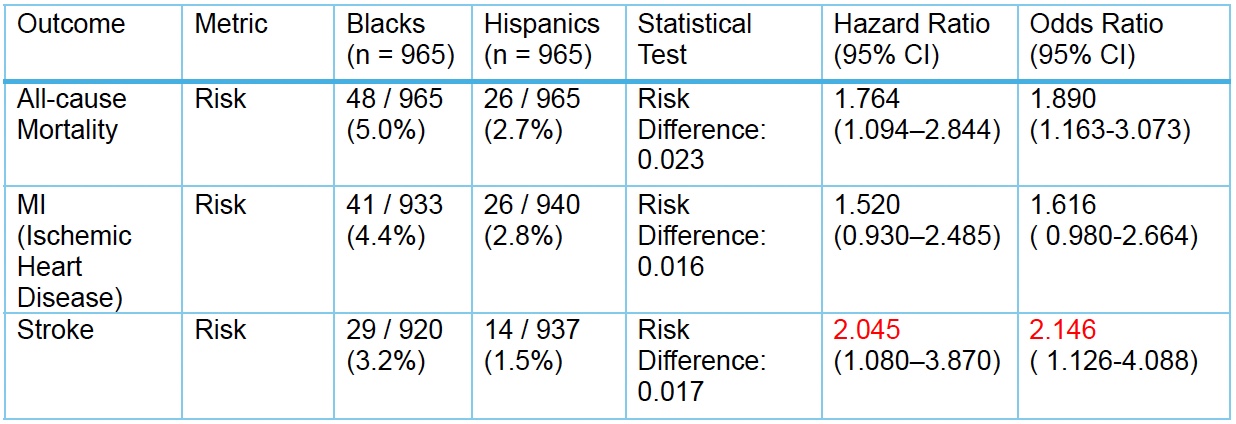Session Information
Date: Tuesday, October 28, 2025
Title: (2015–2051) Miscellaneous Rheumatic & Inflammatory Diseases Poster III
Session Type: Poster Session C
Session Time: 10:30AM-12:30PM
Background/Purpose: Neuromyelitis optica (NMO) is a rare, chronic, immune-mediated, demyelinating disorder predominantly affecting the optic nerve and spinal cord. Despite increasing awareness, racial disparities in NMO outcomes remain poorly characterized.
Methods: This retrospective cohort study used TriNetX, a global federated health research network of 144 healthcare organizations. Two Cohorts were defined: Cohort A (Black or African American with Neuromyelitis Optica; n= 2,101) and Cohort B ( Hispanics or Latinos with NMO; n= 1,007). Inclusion criteria required patients to be 18 years or older with at least an NMO diagnosis within the past 20 years. Exclusion criteria included patients younger than 18 or diagnosed more than 20 years ago.Propensity score matching (1:1) was performed to balance demographics and comorbidities, including age, sex, obesity, dyslipidemia, diabetes, hypertension, kidney disease, and chronic respiratory disease. The final matched sample included 965 patients per group. Outcomes assessed included all-cause mortality, stroke, and myocardial infarction (MI).
Results: After matching, both cohorts had similar characteristics (mean age 46 years; 76.7% female). Inflammatory markers such as ESR and CRP were higher in Black patients. All-cause mortality was significantly higher among Black patients compared to Hispanic patients (5.0% vs. 2.7%; OR 1.89, 95% CI 1.16–3.07). MI occurred in 4.4% of Black patients vs. 2.8% of Hispanic patients (OR 1.62, 95% CI 0.98–2.66). Stroke occurred in 3.2% of Black patients compared to 1.5% of Hispanic patients, with a statistically significant difference (OR 2.15, 95% CI 1.13–4.09).
Conclusion: This study’s findings underscore significant racial disparities in clinical outcomes among patients with Neuromyelitis Optica. Black patients had higher rates of all-cause mortality, myocardial infarction, and stroke compared to their Hispanic counterparts, despite comparable baseline characteristics. The elevated odds of death and cerebrovascular events in the Black cohort suggest potential underlying differences in disease progression, access to care, or treatment response. These results highlight the need for tailored interventions and equitable healthcare delivery to mitigate outcome disparities in NMO.
 Table 1. Demographic Comparison of Blacks and Hispanics – Pre- and Post-Propensity Score Matching
Table 1. Demographic Comparison of Blacks and Hispanics – Pre- and Post-Propensity Score Matching
To cite this abstract in AMA style:
Okeke C, Lam J, Edwards Q, Mamoh U. Racial Disparities in Outcomes Among Patients With Neuromyelitis Optica: A Global Population-Based Study [abstract]. Arthritis Rheumatol. 2025; 77 (suppl 9). https://acrabstracts.org/abstract/racial-disparities-in-outcomes-among-patients-with-neuromyelitis-optica-a-global-population-based-study/. Accessed .« Back to ACR Convergence 2025
ACR Meeting Abstracts - https://acrabstracts.org/abstract/racial-disparities-in-outcomes-among-patients-with-neuromyelitis-optica-a-global-population-based-study/

.jpg)